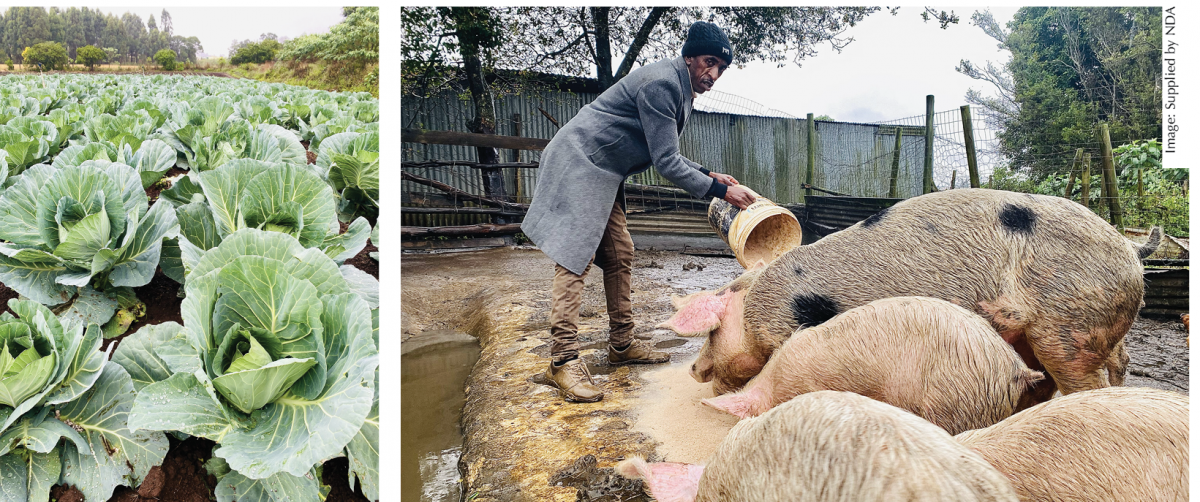Creating a lasting impact in your community is not just about making once-off donations — it's about introducing initiatives that can truly transform lives. Creating employment opportunities has meant changing the lives of others for members of the Magazi Farming Projects in Dubana, Lusikisiki in the Eastern Cape.
The members of the farming project are an example of how communities can come together to honour the life and legacy of the late President Nelson Mandela through job creation.
Annually, the global community celebrates Nelson Mandela Day on 18 July and calls for individuals, communities and organisations to take time to reflect on President Mandela's values and principles and to make a positive impact in their own communities.

In an interview with Vuk’uzenzele, the Chairperson of Magazi Farming Projects, Magazi Zizamele, said he and five members of the cooperative saw the need to make an impact through job creation.
He added that the idea to establish the cooperative came after realising that Dubana is populated by many women and young people who are unemployed.
“With few jobs available in the South African labour market, I highly recommend that people, especially the youth, should venture into entrepreneurship so that they can be self-employed and create jobs for their fellow community members” he said.
“Apart from the five members of the cooperative, we have created four permanent jobs and six temporary positions for our fellow locals. Over and above that, we usually donate some of our food products to impoverished residents so that we can alleviate hunger in our community.”
With the success of the cooperative, locals are benefiting from the job opportunities created by the farming project. One of the famous quotes by Nelson Mandela says “overcoming poverty is not a gesture of charity. It is the protection of a fundamental human right, the right to dignity and a decent life.”
Echoing Madiba’s sentiments, Zizamele said: “Being in a position to put food on the table brings one's dignity back as one is able to look after themself.” Magazi Farming Projects was established in 2016 to focus on crop production, including cabbages and spinach, which it has supplied to the local Spar and Boxer stores since 2020.
It also supplies products to local hawkers and community members, including fruit such as oranges, as well as piggery and poultry products. It has a total of 15 hectares of land but currently only uses five. The growth and success of Magazi Farming Projects led to the launch of the Ingquza Fresh Produce Secondary Cooperative (IFPSC), thanks to the intervention of the National Development Agency (NDA).
A secondary cooperative is a cooperative whose members are other, primary cooperatives. It is formed by two or more primary cooperatives. The NDA set aside R1.9 million in funding for Ingquza Fresh Produce Secondary Cooperative to collectively upskill their production, create job opportunities, and increase sustainable income.
“It is a good idea to be part of the secondary cooperative because it will help us address the struggles we previously faced with accessing funding and expanding our product offering to bigger markets. Through our collaboration, we will finally close a deal with Potato South Africa, and we will further expand into producing cauliflower, broccoli, macadamia nuts and beekeeping,” Magazi explained.
Other primary cooperatives that are part of this initiative include Masakhiwe Agricultural Cooperative, Intaniso Primary Cooperative, Yamampondomise Primary Cooperative, Itha Lam Farm & Breeding Primary Cooperative, Uncedo Primary Cooperative, Amajabangqa Agricultural Primary Cooperative, and Mtshini Agricultural & Multi-purpose Cooperative.
Bringing together small-scale farmers
The NDA Acting Chief Executive Officer, Thabani Buthelezi, said the agency’s role includes formalising the secondary cooperative by bringing together small-scale farmers and providing capacity-building training in financial management and basic bookkeeping.
This, he added, will ensure they remain compliant and can account for government funds allocated to them. The NDA also provides a grant to purchase goods they can jointly utilise, including a tractor.
“We also rely on other partners to ensure that the funded organisations receive ongoing technical support, mentorship and linkages to markets so that they remain sustainable,” said Buthelezi. The funds will be used to procure a tractor, implements, a potato planter, potato harvester, and disc ridger, among other items. Jointly, all the primary cooperatives occupy 176 hectares of land, focusing on high-demand crops like spinach, butternut, potatoes, cabbage and peppers.
A member-cooperative called Amajabangqa Agricultural Primary Cooperative (AAPC), based in Bazana, operates on five hectares of the available 60 hectares of arable land. It also focuses on cabbage production on land provided by the traditional leadership. Over the years, AAPC has received financial and technical support from various stakeholders, including R99,903.86 in funding from the NDA in 2022/23 for a water system comprising a generator and irrigation pipes, as well as production inputs such as fertilisers and seedlings. The NDA provided further support worth R337,455.76 under the sustainability programme in the 2024/25 financial year.
The local municipality has also been instrumental in providing some of the cooperatives with agricultural inputs since 2024. The Department of Agriculture has also provided 2km of fencing for crop protection and an irrigation system to AAPC.
Contact the IFPSC at Ingquzafreshproduce2@gmail.com
For more information on the NDA, visit: www.nda.org.za



 Facebook
Facebook Twitter
Twitter WhatsApp
WhatsApp